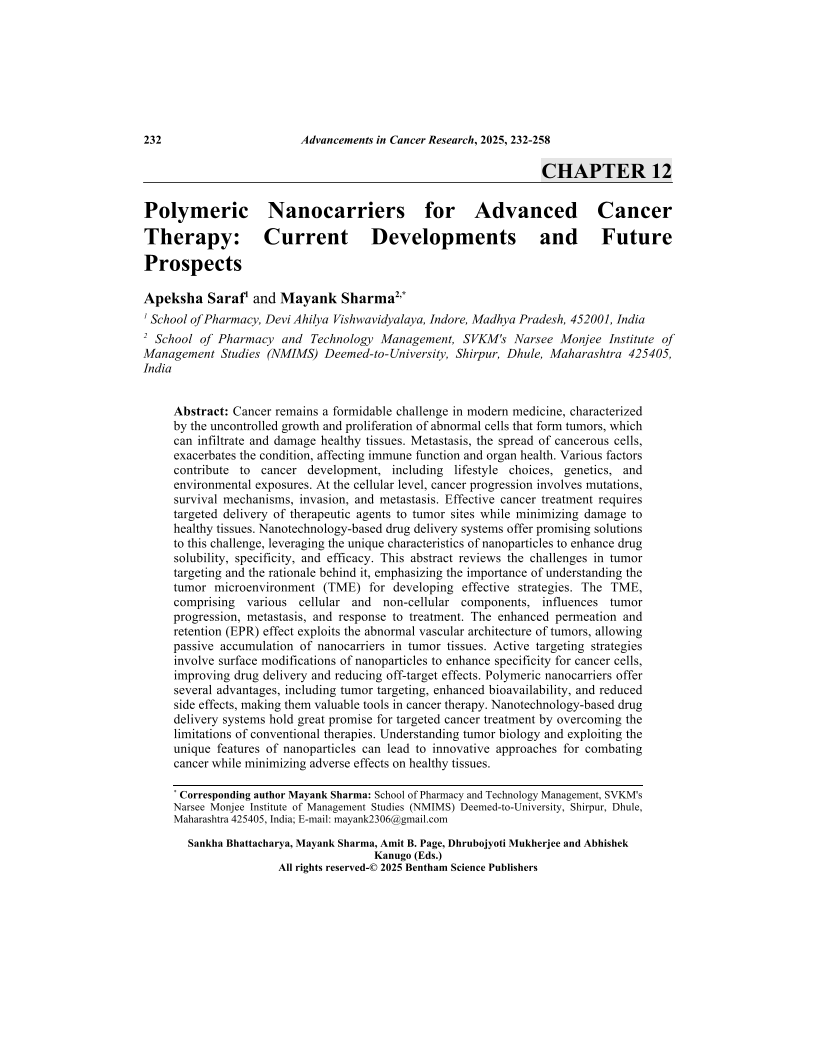Polymeric Nanocarriers for Advanced Cancer Therapy: Current Developments and Future Prospects

- Authors: Apeksha Saraf1, Mayank Sharma2
-
View Affiliations Hide Affiliations1 School of Pharmacy, Devi Ahilya Vishwavidyalaya, Indore, Madhya Pradesh, 452001, India 2 School of Pharmacy and Technology Management, SVKM's Narsee Monjee Institute of Management Studies (NMIMS) Deemed to-University, Shirpur, Dhule, Maharashtra 425405, India
- Source: Advancements in Cancer Research: Exploring Diagnostics and Therapeutic Breakthroughs , pp 232-258
- Publication Date: February 2025
- Language: English
Polymeric Nanocarriers for Advanced Cancer Therapy: Current Developments and Future Prospects, Page 1 of 1
< Previous page | Next page > /docserver/preview/fulltext/9789815305906/chapter-12-1.gif
Cancer remains a formidable challenge in modern medicine, characterized by the uncontrolled growth and proliferation of abnormal cells that form tumors, which can infiltrate and damage healthy tissues. Metastasis, the spread of cancerous cells, exacerbates the condition, affecting immune function and organ health. Various factors contribute to cancer development, including lifestyle choices, genetics, and environmental exposures. At the cellular level, cancer progression involves mutations, survival mechanisms, invasion, and metastasis. Effective cancer treatment requires targeted delivery of therapeutic agents to tumor sites while minimizing damage to healthy tissues. Nanotechnology-based drug delivery systems offer promising solutions to this challenge, leveraging the unique characteristics of nanoparticles to enhance drug solubility, specificity, and efficacy. This abstract reviews the challenges in tumor targeting and the rationale behind it, emphasizing the importance of understanding the tumor microenvironment (TME) for developing effective strategies. The TME, comprising various cellular and non-cellular components, influences tumor progression, metastasis, and response to treatment. The enhanced permeation and retention (EPR) effect exploits the abnormal vascular architecture of tumors, allowing passive accumulation of nanocarriers in tumor tissues. Active targeting strategies involve surface modifications of nanoparticles to enhance specificity for cancer cells, improving drug delivery and reducing off-target effects. Polymeric nanocarriers offer several advantages, including tumor targeting, enhanced bioavailability, and reduced side effects, making them valuable tools in cancer therapy. Nanotechnology-based drug delivery systems hold great promise for targeted cancer treatment by overcoming the limitations of conventional therapies. Understanding tumor biology and exploiting the unique features of nanoparticles can lead to innovative approaches for combating cancer while minimizing adverse effects on healthy tissues.
-
From This Site
/content/books/9789815305906.chapter-12dcterms_subject,pub_keyword-contentType:Journal -contentType:Figure -contentType:Table -contentType:SupplementaryData105

